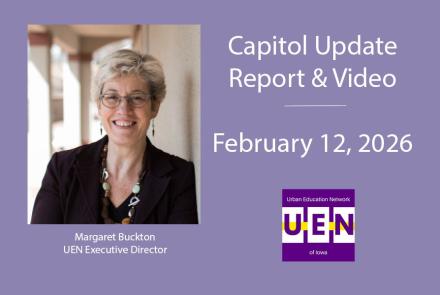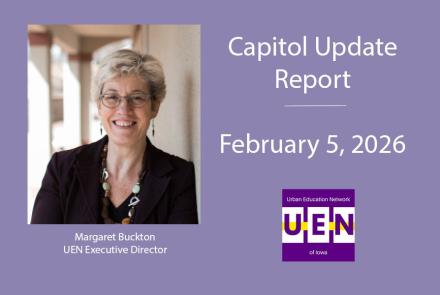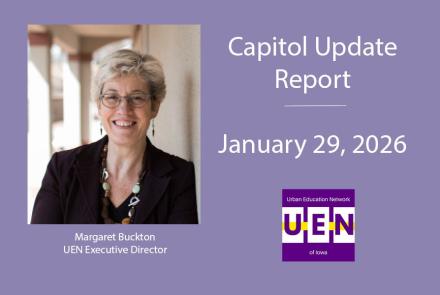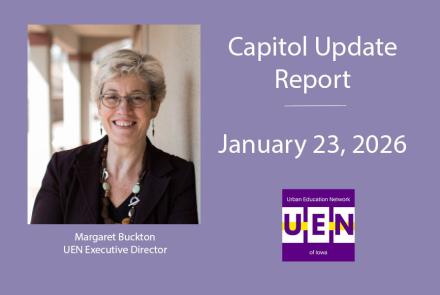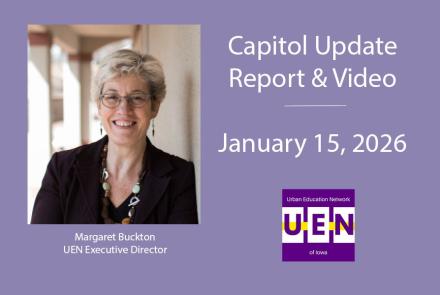UEN Testimony: Charter School Proposed Rules
UEN Testimony: Charter School Proposed Rules
https://educateiowa.gov/documents/iowa-state-board-education/2021/09/2021-09-16-tab-b-rules-new-chapter-19-charter-schools Oct. 26, 2021
Thank you to members of the Iowa State Board of Education for considering stakeholder input concerning this proposal: New rule 281 Chapter 19 Charter Schools
Download the full, printable UEN Testimony: Charter School Proposed Rules
The Urban Education Network of Iowa, composed of 20 Iowa public school districts that enroll nearly 40% of the students in Iowa public schools, provides the following comments regarding the subject rules proposal.
The Urban Education Network opposed the second option of establishing charter schools in Iowa through a founding group-state board model, however, we realize that much of this proposal is simply restating the requirements in HF 813 Charter Schools enacted in the 2021 Session, leaving your body with little discretion in implementing the statutory requirements. We are limiting our comments to the founding group-state board model and a few specific areas where we believe the State Board could exercise some discretion in setting criteria to implement the statute while clarifying in a very transparent way, the purposes and expectations of Iowa Public Charter Schools.
Background:
HF 813, Charter Schools, enacted in the 2021 Session, as amended by HF 847 Education Flexibility, expands Iowa Public Charter School options for school boards and creates a new second model, the founding group-state board model. The purposes for charter schools are articulated in the statute, at the very beginning, NEW SECTION. 256E.1 Establishment of charter 2 schools —— purpose. Since enrollment into a charter school will very likely move some students out of their neighborhood public school or a school they chose through open enrollment, and could also attract students from Iowa’s accredited nonpublic schools, it is critical that these rules ensure transparency and accountability so students enrolling in charter schools and those students staying in the public school (or accredited nonpublic school) are both well served.
Concern:
As written in HF 813, there is no requirement to elect or vet the governing board members of a proposed charter school, only half of whom are required to live in the geographic region in which the charter school is located. As such, it is critical to set a high standard for transparency and accountability. It is further necessary due to the track record of charter schools around the nation.
Although there are some charter schools that may provide benefits for students, there are many that simply cannot because they no longer exist. Forbes Magazine, Sept. 28, 2018 quotes a study by the Center for Media and Democracy that found 2,500 charter schools closed between 2000 and 2013. Charters close sometimes at the end of the year, sometimes in the middle, or sometimes having never really opened. Sometimes they close for not meeting the expectations in the contract, but the study reported that was rare. It’s usually a financial and can be related to fraudulent activities. For context, NCES reports that by 2019, there were approximately 7,500 public charter schools operating in the nation. Another study reported in the Washington Post last August, analyzed charter schools that opened between 1998 and 2017 and found the following: 18% had closed within 3 years of opening; 25% closed with 5 years; 40% closed within 10 years; and only 5 of 77 groups of charters were still open after 15 years.
The stakes are high for students and families who respond to marketing by businesses running charter schools, only to find themselves without the school they expected. This means the governing board’s selection of an administrator is also high stakes. (See UEN testimony to BOEE regarding proposed rules for Charter School Administrator Authorization, Oct. 26, 2021.) Charter school advocates may say that educational leadership experience is not necessary to run a charter school, which is a business. If this belief is a driver of the charter school movement in Iowa, it is up to the state executive branch, through BOEE authorization and state Board of Education oversight, to ensure that Iowa’s charter schools are of high quality. A demonstration of business experience and other criteria, as a minimum bar to reach, should be included in the BOEE’s rules for a Charter School Administrator Authorization and absent there, should be included in the charter school application to the BOEE.
Suggestions to Amend Proposed Rules:
Members of the Urban Education Network encourage the State BOE to consider the following:
- 19.8(1) (a) and (b): Require identification of the statutory purpose, which is repeated from HF 813 in these proposed rules section 19.3, which the charter school is intending to address, be included in the executive summary and vision/mission section of the application. (Later parts of the application that identify target population, instructional methods and deliverable metrics should specifically align to this intended purpose.)
- 19.8(1) c: Include in the description of the proposed geographic area to be served by the charter school the names of school districts and accredited nonpublic school from which students are eligible to enroll in the charter school. (Later parts of the application that demonstrate needs and community support should also show significant evidence of involvement from all impacted schools.)
- 19.8 (f): Evidence of need should specify lack of services available to meet the targeted population and how provision of the charter school will supplement and not supplant opportunities already existing in the geographic area. This is especially important in content areas such as CTE, Computer Science, College Prep and other programs where public-school districts are already collaborating to find a financially stable economy of scale. The evidence of need should also demonstrate the importance of the statutory purpose the charter school intends to fulfill.
- 19.8 (g): background information on charter personnel is required to be provided if available. If it is not available, the application should state when it will be available and subsequently provide the information to the State Board.
- 19.8 (l) and (n): Plans for identifying students with disabilities, students who are limited English proficient, students who are academically failing or below grade level, and gifted students, including but not limited to compliance with applicable laws and regulations, should also require a description of how the charter school marketing and recruitment activities will specifically target these students and the expected proportional enrollment of students in these groups. (These plans should tie back to the evaluation/metrics of success components to demonstrate that the intended purpose was achieved.)
- 19.8 (o): include requirements that disciplinary sanctions for both general students and special education students include collection of demographic data to ensure compliance with civil rights and equity policies.
- 19.8 (r): plans for recruiting staff should acknowledge difficulties of teacher shortages in content areas and in geographies and show some creativity that will ensure the charter school does not simply plan to mine the staff of public and nonpublic schools in the area, leaving them at risk of noncompliance.
- 19.8 (t): evidence in the charter school contract with an education service provider, if any, that the provider is subject to open meetings, public records, and other financial transparency requirements. If not included in the contract, statement of how the charter school governing board will operate with full information necessary to meet the needs of students in the charter school and how that information will be available to the public.
Criteria for approval of a founding group – state board charter school application: HF 813 set some specific requirements for the State BOE to set or follow criteria for approval. Much of this is simply restated in 19.6, including that the state BOE shall include the criteria for approving an application in the application instructions, and shall employ procedures, practices and criteria consistent with nationally recognized principles and standards for reviewing charter school applications. Such criteria are not stated in these proposed rules, even though the statute requires the application to only be awarded if the charter demonstrates compliance with each element of the approval criteria (how will anyone know if the criteria are not published in these rules or elsewhere easily accessible?). In addition to the nationally recognized criteria, the State Board is required to approve an application based on documented evidence. This should include input from public and nonpublic schools in the geographic region on how the charter school will impact the ability of the public school to meet the needs of students and if the programs and opportunities are already available in the geographic region. The third specific requirement in HF 813 regarding approval of a charter application requires the state BOE to “Adhere to the policies and criteria that are transparent, based on merit, and avoid conflicts of interest or any appearance thereof.” We would suggest that transparency requires the criteria to be specifically articulated in these rules, giving Iowans the chance to provide input into this rules process.
Thank you for the opportunity to comment.
UEN Contacts and link to the proposed rules follow:
Contacts UEN Executive Director, Margaret Buckton, margaret@iowaschoolfinance.com 515.201.3755 UEN Chair, Noreen Bush, Superintendent, Cedar Rapids Community School District, nbush@crschools.us
Proposed Rules as presented to the State Board of Education, Sept. 16, found here:
https://educateiowa.gov/sites/files/ed/documents/Chapters%2019%2068%20NIA%20Sept%202021%20SBE%20Tab%20B.pdf



